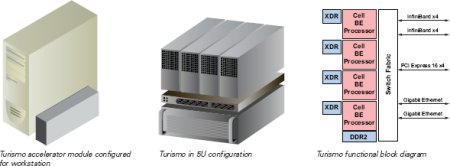Yellow Dog Linux powers first Cell-based product
Nov 14, 2005 — by LinuxDevices Staff — from the LinuxDevices Archive — 4 views The world's first commercial product based on the Cell BE (broadband engine) processor is expected to ship with a Yellow Dog Linux BSP (board-support package) in Q1, 2006. Mercury Computer Systems says Terra Soft Solutions, one of its VARs (value-added resellers), is developing the BSP.
The world's first commercial product based on the Cell BE (broadband engine) processor is expected to ship with a Yellow Dog Linux BSP (board-support package) in Q1, 2006. Mercury Computer Systems says Terra Soft Solutions, one of its VARs (value-added resellers), is developing the BSP.
(Click for larger view of Mercury's Dual Cell Based Blade)
Additionally, Mercury announced its second Cell BE product, a “Turismo” system targeting dense-computing applications.
The Cell BE processor is best-known as the processor embedded in Sony's Linux-capable PlayStation 3, expected to ship next spring. However, the chip also targets a range of embedded and high-performance computing applications. IBM and Sony last week released Linux development tools for the Cell BE — including kernel patches, toolchains, and emulators — aimed at letting potential customers evaluate the chip and start writing applications for it.
Dual Cell blade
Mercury's “Dual Cell Based Blade” is designed to work in IBM “BladeCenter” managed server chassis systems. It targets graphics-intensive workloads, and computationally intensive high-performance computing (HPC) applications in medical imaging, industrial inspection, seismic processing, telecommunications, and aerospace and defense, Mercury says.
According to Mercury, a single Cell BE processor clocked at 3.0 GHz will deliver 192 single-precision GFLOPS (109 floating-point operations per second), with “even higher” short-integer performance. The company says its Dual Cell Based Blade will offer advantages in both performance-per-Watt and -per-dollar.
Terra Soft says its PowerPC experience and skills will enable it to create a Linux BSP for the Dual Cell Based Blade that installs quickly and simply, and provides a netboot-capable Linux environment. Additionally, the company says it will help integrate the BSP with Mercury's Y-HPC cluster construction and management softweare suite.
Mercury's second Cell BE product — Turismo
Mercury says its second Cell BE product — Turismo — will allow customers to assemble “some of the world's densest computing solutions.” Four Turismo boxes in a 5U configuration are expected to yield 3.2 single-precision TeraFLOPS (1012 FLOPS), and more than 25 TeraFLOPS in a 6-foot rack.
To put that in perspective, a 25 TeraFLOPS computer would rank about 250th on the Top 500 list of the world's fastest computers released today at this week's SuperComputing 2005 event in Seattle, Wash.

Turismo mockups and diagram
(Source: Mercury Computing. Click to enlarge)
The Turismo platform is also expected to run a Yellow Dog Linux BSP to be developed by Terra Soft, along with Mercury's MultiCore Plus Advantage clustering and high-availability middleware.
Terra Soft CEO Kai Staats said, “At a time when individual processor frequencies no longer define the leading product, the Cell processor's 1+8 processor architecture introduces an entirely new way of designing for computationally intensive applications.”
IBM VP of engineering and technology services, Raj Desai, said, “By incorporating Cell microprocessor technology into products outside the gaming space, Mercury can develop unique technology solutions for demanding applications, such as sonar, radar, MRI, and digital X- ray.”
This article was originally published on LinuxDevices.com and has been donated to the open source community by QuinStreet Inc. Please visit LinuxToday.com for up-to-date news and articles about Linux and open source.